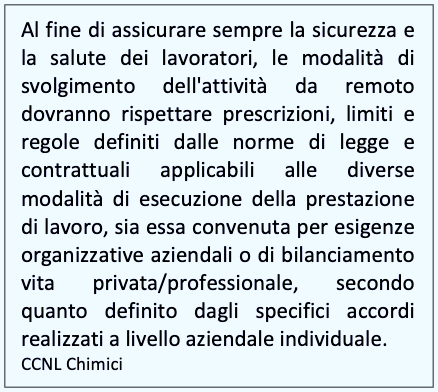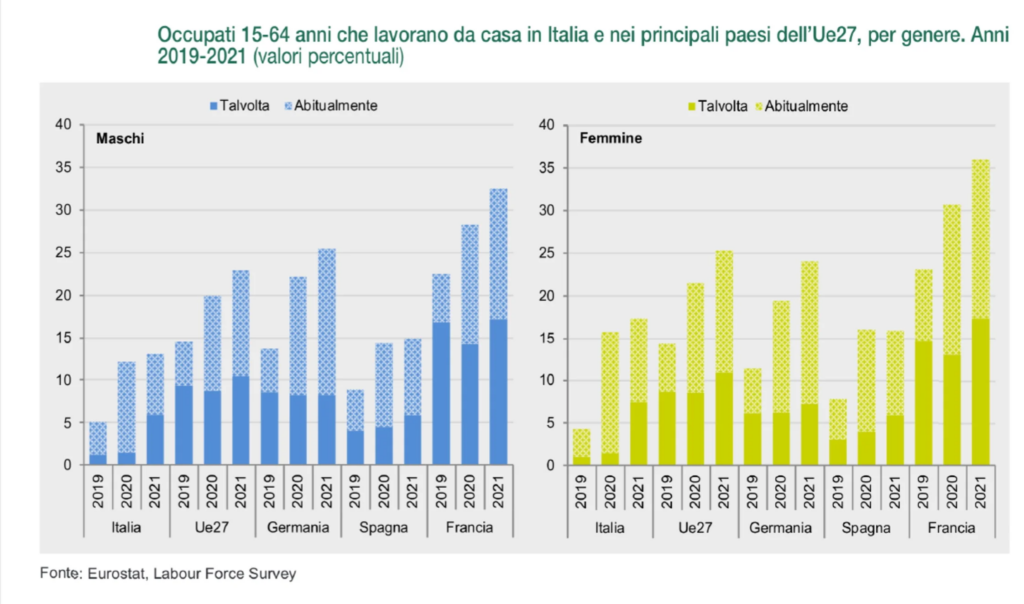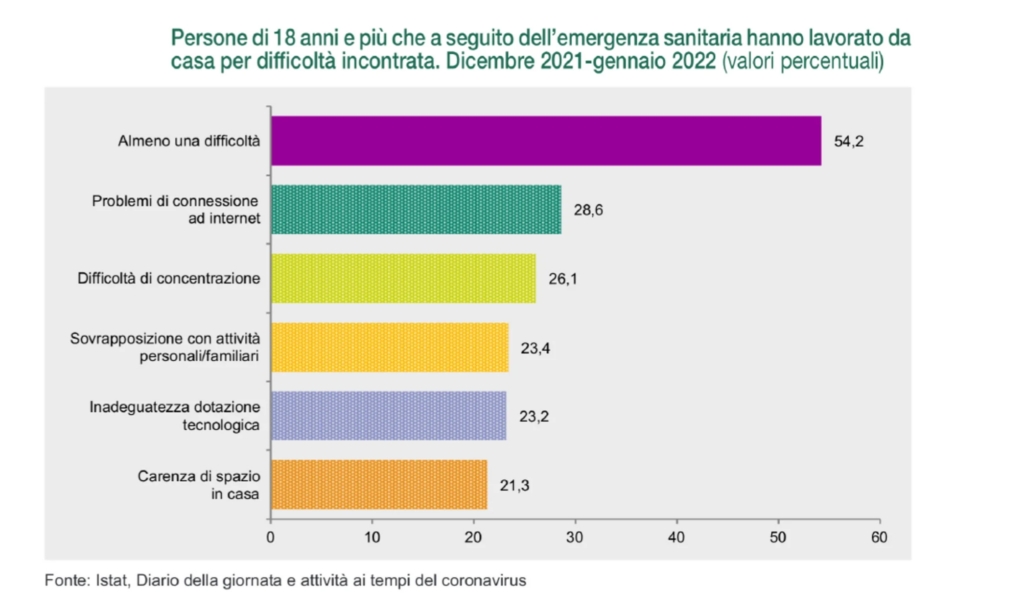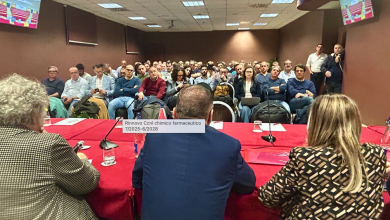
Smart working, one step forward and two steps back
After more than two years of simplified regime, from 1 September we return to normality, moving the hands to 30 months ago: to take advantage of agile working, you need to sign an individual agreement with the company. At least
 that you are not part of those sectors or those companies with which the union has contracted it: about 3 million workers. For Istat we are at 13.6 per cent, against an EU average of 20.6
that you are not part of those sectors or those companies with which the union has contracted it: about 3 million workers. For Istat we are at 13.6 per cent, against an EU average of 20.6
After more than two years of pandemic and simplified regime, all kinds of emergencies and extensions have ended, for smart working back to normal, i.e. in the manner envisaged before the outbreak of Covid 19: from 1 September it is once again mandatory to sign an individual agreement with the company, a procedure which certainly does not promote the measure but which protects the worker from the company's managerial power. At the same time, the regulatory protection for the frail and for the parents of children under the age of 14 has expired since 1 August, who must therefore return to the presence, unless there are second thoughts in the process of converting the Aiuti bis decree into parliament.
The general rules established by law 81 of 2017 apply to everyone, except for those who in the meantime have negotiated smart working with the intervention of union representatives. We are talking about two and a half million, three million workers, among those included in the national collective agreements which have regulated smart working during the renewal phase and those who can take advantage of it thanks to ad hoc company agreements, large groups as well as individual companies: from textiles to paper industries, from food to the post office, from Autostrade to Zurich up to Snam, Tim, Furla, just to name a few.
“In the last two years we have had a significant boost to smart working through the action of collective bargaining – explains Nicola Marongiu, of the national CGIL -: over 250 company agreements and 25 collective labor agreements in the private and public sector have regulated it. Even the latter, electricity, energy, oil, credit, collection, central functions, local authorities. All this suggests that it will not be a completely abandoned method but will be used in the context of companies and sectors that have equipped themselves with contractual instruments”.
For all others, the previous rules remain in force. Spaces are narrowing, the number of profiles admitted is reduced, and the bureaucratic steps become more complicated. Instead, it remains simplified regime of communications to the Ministry of Labour: companies will not have to transmit the individual agreements one by one, but only the list of employees who have signed the agreement. The agreements must be written and regulate the rest times, in addition to the measures to ensure disconnection, they can implement the rules of a unilateral company regulation or an agreement between the company and the union.
 “Smart working is not a subjective right, it cannot be imposed by the worker on the company, but where it has been the bargaining responded to business needs: this is the correct path from which there is no going back - says the confederal secretary of the CGIL Tania Scacchetti -: implement the measure through national and company bargaining, in order to respond to specific needs. The experience of these two years tells us that we must minimize the conditions of loneliness of the worker, and collective bargaining must be able to provide rules that are valid for everyone”.
“Smart working is not a subjective right, it cannot be imposed by the worker on the company, but where it has been the bargaining responded to business needs: this is the correct path from which there is no going back - says the confederal secretary of the CGIL Tania Scacchetti -: implement the measure through national and company bargaining, in order to respond to specific needs. The experience of these two years tells us that we must minimize the conditions of loneliness of the worker, and collective bargaining must be able to provide rules that are valid for everyone”.
And that is: alternation between face-to-face and remote work, with a previously identified number of days in the month or year, the possibility of carrying out remote activities, such as meetings or training, even for those who cannot resort to smart phones due to the services they perform, definition of the operability bands, the famous speech the right to disconnect, the issue of equipment and access to benefits such as meal vouchers.
“The return to individual agreement and voluntariness for access to that type of service is essential, because many companies are not structured with suitable organizational models – continues Marongiu -. The other aspect to consider is also the type of businesses that we have in our reality, small and medium-sized. To guarantee smart working, investments are also needed of an organizational nature which, however, many companies have not made. Before the emergency, this tool was used very little, then there was the boom due to the emergency measures, to now return to a normal phase, in which a portion of companies will continue to operate with the use of smart working".
 That in Italy there is a tendency to dismiss this experience is confirmed by the latest Istat report. There diffusion remained steady at 13.6 percent against a European average of 20.6. But if we look at neighboring Germany and France, the difference is even more marked: beyond the Alps, the smart almost reached 25 percent in the first case and exceeded 30 in the second. On the other hand "working from home has led to difficulties", writes the Istat report.
That in Italy there is a tendency to dismiss this experience is confirmed by the latest Istat report. There diffusion remained steady at 13.6 percent against a European average of 20.6. But if we look at neighboring Germany and France, the difference is even more marked: beyond the Alps, the smart almost reached 25 percent in the first case and exceeded 30 in the second. On the other hand "working from home has led to difficulties", writes the Istat report.
Based on what emerged from the third edition of the survey "Diary of the day and activities in the time of the coronavirus", more than one in two workers report them: internet connection problems and concentration difficulties were reported by more than one out of four, while a slightly lower percentage complained of lack of technological equipment, adequate space at home and the overlap between work and personal and family activities.
 According to the statistical institute's surveys, people interested in working remotely are divided in half between those who are (55.2 percent) and those who are not, net of those who perform a service that is not compatible with this method . Evident, underlines Istat, the differences between those who have already experienced it and those who haven't: among the former those in favor leap to 73.5 per cent, against 38.4 of those who have not yet had experience. Working two or three days a week represents the ideal hybrid model for those who say they are interested in this form of flexibility, equal to 69.5 percent. On the other hand, 16.6 percent would prefer to use it more rarely, while a slightly lower percentage shows availability for a more advanced model: 13.8 percent would like it every day or almost.
According to the statistical institute's surveys, people interested in working remotely are divided in half between those who are (55.2 percent) and those who are not, net of those who perform a service that is not compatible with this method . Evident, underlines Istat, the differences between those who have already experienced it and those who haven't: among the former those in favor leap to 73.5 per cent, against 38.4 of those who have not yet had experience. Working two or three days a week represents the ideal hybrid model for those who say they are interested in this form of flexibility, equal to 69.5 percent. On the other hand, 16.6 percent would prefer to use it more rarely, while a slightly lower percentage shows availability for a more advanced model: 13.8 percent would like it every day or almost.
“As a union we have pressed for bargaining to be the main tool for regulating smart working – concludes Scacchetti -. Here we are not just talking about remote working, but about a change in organizational models, more centered on work for goals, of a different way of relating between the worker and the company, more prone to participation, of a real opportunity because it allows us to think about many aspects, including environmental and social sustainability. But to implement them, you have to make investments often of a technological nature, companies must adopt new systems. All of this can be done through bargaining and not with a standard. If the negotiation will be able to expand, even the legislative dictation will be able to adapt”.
Related news: Smart working: here's what changes from September 1st
Notes: To date, smart working in Italy, both for the public and private sectors, is governed by the Law 22 May 2017, n. 81 art. 18 And art. 19





